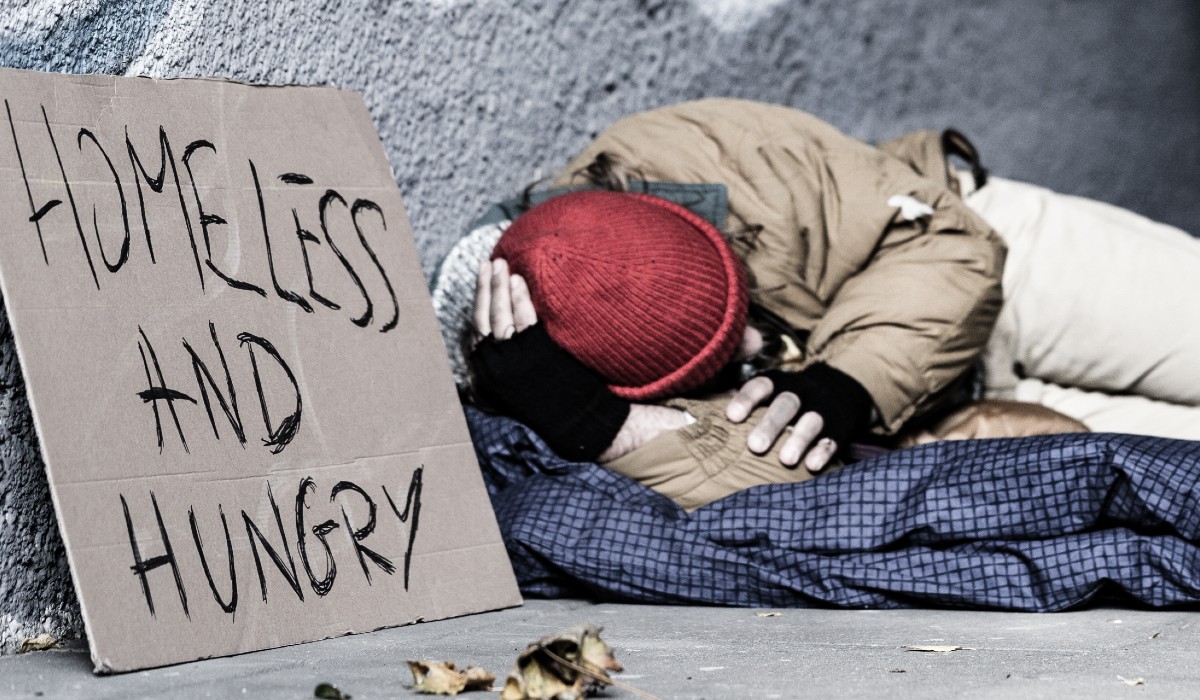 Homeless person. Photo: Adobe Stock / Licensed
Homeless person. Photo: Adobe Stock / Licensed
The relentless rise in the cost of living is unsustainable for most, and resistance is the only realistic answer, argues Terina Hine
Millions of people are suffering severe hardship this winter; the last few months have proved the toughest many have ever faced. Now we are told food inflation has reached a record 16.7%, costing families an additional £800 per year.
Meals were already being skipped by people unable to make ends meet. One in five reported they were eating less or using out-of-date food, when surveyed by the Office of National Statistics (ONS) at the end of 2022, while one in four of us were unable to heat our homes. The number of people going hungry had more than doubled by December 2022 from before the pandemic.
Household income will continue to fall by almost 4% this year. On the back of a 3% decrease last year, this translates to a huge £2,100 drop in income over a two-year period, the largest fall since 1975, bigger than during the 2018 financial crisis. This is why more and more working people are resorting to food banks.
Workers are sick of poverty wages, inflation and government inaction, so on Wednesday we will see the biggest day of coordinated strike action in a generation. The impact of strikes can be difficult as children stay home from school and hospital appointments are cancelled, but the impact of falling pay and years of underinvestment in vital public services is massive. No wonder that support for the strikes remains strong.
The government is keen to downplay the dire state of the economy. They tell us inflation is going to fall, but this will only be because of how it is measured: by comparing prices to the same point of time in the previous year. And we have now suffered a year of excessive price rises. But even if the overall inflation figure decreases, the price of basic commodities – food, rent, energy – remain unaffordable and keep rising.
Blaming the victims
Britain, one of the richest countries in the world, is increasingly divided between the haves and have nots. Lower-income families, who spend a greater share of their income on essentials, have been disproportionately hit by the food and energy price hikes, but The Daily Mail keeps up its relentless attack on welfare ‘shirkers’ receiving money for nothing, while Tory MPs such as Lee Anderson perpetrate the myth that the poor are to blame for their own poverty, claiming they ‘cannot cook properly … cannot budget’. Of course he is right, many people cannot cook properly, but not as he suggests for lack of talent, but for lack of food or fuel. Unlike 316 of his fellow MPs, who claimed their utility bills on expenses last year, the rest of us are required to pay bills from our wages.
Families report using savings, taking out loans, selling or pawning possessions, failing to renew insurance, and stopping pension contributions. More and more are reducing the numbers of showers they take and are unable to keep warm. The physical and mental impact is immediate; 63% of those on the lowest incomes are stressed about how to make ends meet. Emotional distress increases hand-in-hand with economic stress; no wonder our mental-health services are at breaking point. And clearly there is a long-term economic impact too.
Those who rely on benefits are ‘close to destitution levels’ according to the Rowntree Foundation, and the more children you have, the worse off you become. Thanks to our Victorian welfare system, families with three or more children suffer increasing levels of poverty and food insecurity. Four-million children were living in poverty in 2020-21, and that figure will be higher today.
While income for the poorest fell in 2022, it rose by 1.6% for the richest fifth of the population. Those lucky enough to have savings and investments are doing quite well, and those who, like the former chancellor, manage to avoid paying tax, do even better.
This is the state of Britain: an 87-year-old woman dying because she was unable to heat her home, a two year old dying because of mould growing in his flat, more and more children presenting with breathing difficulties due to damp living conditions, and more still unable to concentrate and learn because they go to school with empty stomachs.
Workers have had enough. Parents have had enough. For many of us the choices on how to budget are increasingly bleak. None of this should be necessary in a country as wealthy as the UK. No wonder over 500,000 workers are striking.
Before you go
The ongoing genocide in Gaza, Starmer’s austerity and the danger of a resurgent far right demonstrate the urgent need for socialist organisation and ideas. Counterfire has been central to the Palestine revolt and we are committed to building mass, united movements of resistance. Become a member today and join the fightback.

